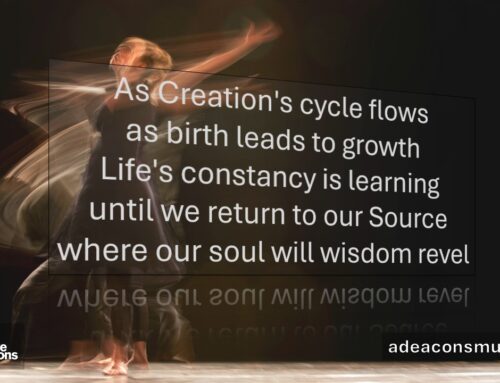 It’s another summer, somewhere between 2001-2007, it’s hot, there’s fires burning around Nipawin, SK, water bombers are pulling water from the Saskatchewan River and, at the same time, fields are ablaze in vibrant yellows, which I would come to recognise as canola in full bloom, and watery, rippling blue, which I would also come to know as flax. In this rural context, where resources and agriculture meet at the base of the Canadian shield, was the first time, I started to get the old and ancient scriptural image of seed sowing.
It’s another summer, somewhere between 2001-2007, it’s hot, there’s fires burning around Nipawin, SK, water bombers are pulling water from the Saskatchewan River and, at the same time, fields are ablaze in vibrant yellows, which I would come to recognise as canola in full bloom, and watery, rippling blue, which I would also come to know as flax. In this rural context, where resources and agriculture meet at the base of the Canadian shield, was the first time, I started to get the old and ancient scriptural image of seed sowing.
I had found, up until that time, there often seemed to be a disconnect for me with the romantic Virgilian pastoral narrative in which the United Church dressed itself. This is not to say that it is not warranted. As our prairie context clearly demonstrates, the variety of ways our denomination has and does understand itself as church includes multiple faith communities who breathe and live in agricultural settings.
The tension, however, for me is that this has not been my experience. In no way, until those years in Nipawin, did I recognise in me a connexion through Creation by way of the earth, soil, seed and crop. Rather, my maternal lived experience is grounded in another creative and generative journey: namely the urban. From my mother, to my Sitto (Arabic for grandmother) we trace our peoples journey back to the fourth century in Damascus. We know cities and the beat of the mercantile, the negotiating, the buying and selling …
So, as I was preparing this first reflection for the beginning of the 2019-20 academic year, I have been trying to figure out how seed sowing and leadership connect. Why I have been exploring this is on account that this is the second theme upon which I intend to reflect as I walk through my second year with you.
Last year, I focused on Leadership and Legacy and the ways in which we must take seriously, with intention, that which we have inherited into the future in new and generative ways. In the changing secular context in which our United Church finds itself, how we navigate that as those who bear the Good News into shadowed times feels missional and, I believe, will constantly require us to be able to articulate that to ourselves, before we even attempt to translate that to a Canada that more and more often does not understand the Christian story. And, if it does, it is too often filtered through theological preferences and experiences that do not reflect well our own understanding of Creation as grounded in diversity as the rainbow before us shines as testament.
Seed sowing and leadership. As I mentioned during Orientation Week, I have been trying to explore this old image through the context of control. So, if you’ll walk a little further with me, hopefully we’ll muddle through this in two ways: our role as seed sowing stewards and ourselves as Creator’s soil in which possibility abound.
What does it mean, to be those who seed sow someone else’s possible harvest? If I learned anything during my years in Nipawin, where GPS meets inputs, where the stock market meets genetics, seeding is meticulous, controlled and exacting. This kind of seed sowing, however, seems to fly in the face of the Corinthian passage that admonishes the reader to not sow sparingly, but bountifully, abundantly. I would even add “with abandon.”
As those of us in this room, who have various roles of leadership in our homes, this college, with friends and family, and within various faith communities what are we to do with this image through the lens of control?
I do not claim that this muddling through this reflective image as stewards seed sowing is novel, but I do believe it remains an intrinsic component of how it is we understand ourselves, both individually and collectively, whether that is as Christian pastors and ministers, educators, disciples and, ultimately, as church. We may indeed want to hold on to these precious germinating possibilities, but we are told to throw them wildly.
This may indeed mean all “we” will see is failure. For it is not the soil, per se, that brings forth the Holy’s creative possibility, but the very act of sowing with trusting abandon. As we wrestle with who is in control, we begin a discipline of discerning where we are called to scatter such seeds. Sometimes such scattering may call us to stay at home. Other times, as Jesus’ own direction to those early disciples often models, it may mean leaving and going into the lives of the Other, even if fear and doubt are present, to share the Good News with abandon.
If one image of seed sowing has been our role as stewards of those generative possibilities, then the other with which I have been muddling has been of you, me, we as the soil itself in which Creator plants. The Genesis story, just one of the Creation threads in Holy Scripture, reminds as that planting is not only good, it is holy. In this sacred context of Creation, as good, there is a joy, an exuberance that may seem to contradict the sternness of some of our protestant traditions.
We may often talk about justice and the social gospel, and these are indeed important ways with which we have, do and shall understand our call as leaders. It is also, I would offer, an interesting point to interject a reflection about control. How does the image of us as Creator’s joyful soil in which possibility abounds connect with the question of control?
If we reflect on our own tendency to control, to exact, to sometimes paint the world in binaries, yet Creator’s abandon seems contrary, how do we reconcile this? What do you do in your own places of leadership in ministry? How do we respond to this: If we are meant to shine, to bloom as a flower incandescent yet we hold onto the trappings of control that not only – possibly – limit our potential, but obscures Creator’s intention?
Before us, kin, Sisters and Brother and Christ, lies a new academic year. A horizon that promises learning and insight, challenge and possibility. These are precious days. We will stretch and grow. We will learn from one another, we will deconstruct theologies that have caused harm and we will, often, simply hold one another and Creator’s trusted creation with care. Sometimes words will suffice, yet often we will simply sit and listen in the places and times where logic and syntax fail. As compassion bearers and dignity’s allies seeds shall be scattered.
Whether I, you, we are those seed sowing or we are being nurtured to do a new thing, may we cultivate in ourselves and one another a reflective, a reflexive, resilience to take seriously the question of control. In this discipline, may we be open to interrogate whether what we do is propelled by our own ego or whether, in the confidence of faith, we make choices to remind one another that not only is that which we do Good, it is also a trust that helps us see in all of Creation the Holy’s beckoning all to wellness, beauty and reconciliation.
May it be so.







“Sometimes words will suffice, yet often we will simply sit and listen in the places and times where logic and syntax fail. As compassion bearers and dignity’s allies seeds shall be scattered.”
I love this statement! I deeply appreciate that we can offer the love of the Divine simply through presence and through the act of coming alongside those in need of care and support.
As a prairie girl and the daughter of a grain farmer the ‘seed sowing’ analogy is one that is dear to me. Thank you for sharing!
Hi Cathy,
Thank you for this kind sharing and affirmation. The image of seed sowing is indeed one that I have – in my head space – understood, but not until realising the prairies were home did I ‘get it.’ I completely agree about the power of presence. In fact, though words are blessed and helpful, it is the embodied moments that seem to reveal the Divine most fully: does that make sense?